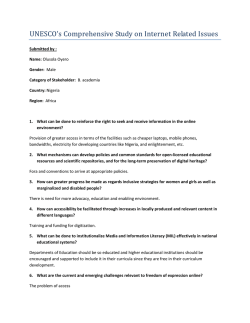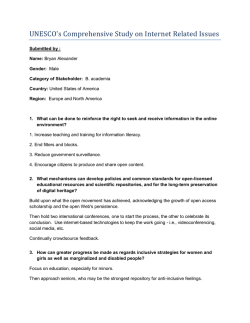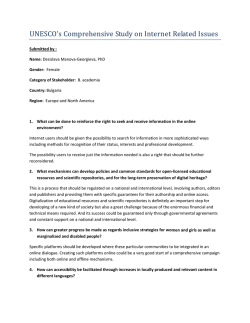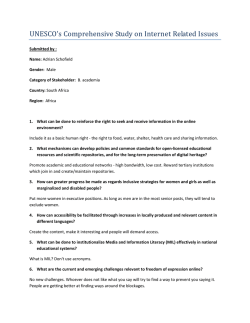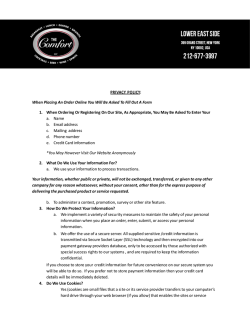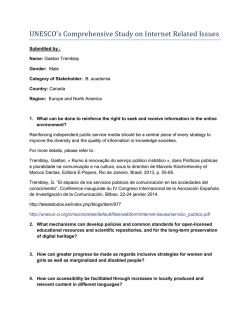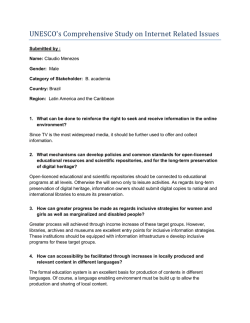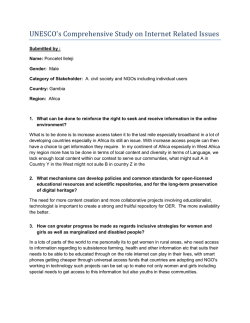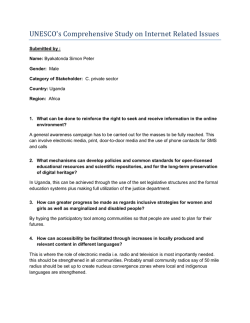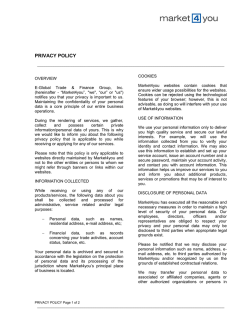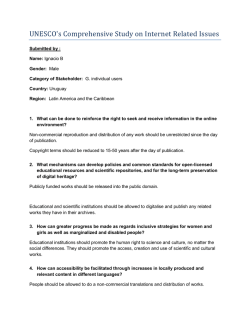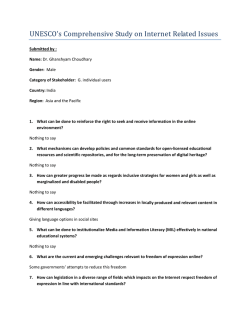
Denisa Kera
UNESCO's Comprehensive Study on Internet Related Issues Submitted by : Name: Denisa Kera Gender: Female Category of Stakeholder: B. academia Country: Singapore Region: Asia and the Pacific 1. What can be done to reinforce the right to seek and receive information in the online environment? I am surprised by the word "reinforce" when such right is not taken seriously even in the "west" in the case of publicly funded research. One simple rule should be that all publicly funded research is open access, that all publicly funded institutions (governments etc) should publish open data and that open data and open access should become a priority in terms of assessing impacts of science, universities etc. 2. What mechanisms can develop policies and common standards for open-licensed educational resources and scientific repositories, and for the long-term preservation of digital heritage? Policies should target publicly funded bodies and assess their performance in terms of how much data and content etc. they publish open in a given year, webanalytics of their use as a performance indicator (so we know this is also communicated), incentives in terms of making it available to various demographic etc. groups, improving data literacy and programming skills in schools and universities. Museums etc. are also often public bodies that should have this in their performance indicators. 3. How can greater progress be made as regards inclusive strategies for women and girls as well as marginalized and disabled people? Creating data literacy courses, programming basic skills etc. 4. How can accessibility be facilitated through increases in locally produced and relevant content in different languages? In places with missing infrastructure we need to support open hardware so anyone can build at least basic computers and tools for accessing and producing data, content etc., courses on re- purposing old computers and hardware, some form of electronics literacy, coupled with support for open source software and platforms such as wikimedia, increasing awareness about crowdfunding supported by public money. 5. What can be done to institutionalize Media and Information Literacy (MIL) effectively in national educational systems? What is MIL? 6. What are the current and emerging challenges relevant to freedom of expression online? Net neutrality, closed hardware infrastructure, nontransparent conflict minerals trade and governance, the dominance of U.S in governing the internet domain name system. Another big problem are patents and copyright, which are used by various trolls. 7. How can legislation in a diverse range of fields which impacts on the Internet respect freedom of expression in line with international standards? Support net neutrality, support open hardware as a standard for infrastructure, and push for more global governance of the internet, support innovation for more ad hoc, decentralized technological solution, support literacy in hardware, software, data. 8. Is there a need for specific protections for freedom of expression for the Internet? Services as wikileaks and attempts to decentralize the internet as Tor project, ad hoc networks are examples where human creativity supports the call for freedom, we should do more so people that are beyond these projects are not persecuted, offer them asylum etc. We should be also worried by the corporate attempts to define internet in terms of infrastructure (various Facebook and Google attempts to bring internet over balloons etc.) 9. To what extent do laws protect digitally interfaced journalism and journalistic sources? It seems that our legal response to any innovation is too slow and various nefarious actors basically misuse the situation for their interests. 10. What are the optimum ways to deal with online hate speech? How can Media and Information Literacy empower users to understand and exercise freedom of expression on the Internet? More self-governance to the users of various popular services (Twitter etc). In many ways, these companies act as despots, tyrants, and do not offer any model of governance of the people using their services. 11. What are the optimum systems for independent self-regulation by journalistic actors and intermediaries in cyberspace? We need stronger awareness of privacy issues and groups advocating and sporting actively privacy, so citizen journalism doesn't end up as a cesspool of gossips and shaming campaign etc. 12. What principles should ensure respect for the right to privacy? I have an orthodox view on this: support more open hardware and software literacy, but also data analytics, so people build their own tools and understand the risks and vulnerabilities of each solution, but also the power and importance of their data. Support stronger and international regulations in terms of how data are managed by corporations. 13. What is the relationship between privacy, anonymity and encryption? We need to balance the technological fixes (encryption/hardware etc) with legislature and social action, but I see as crucial the value of literacy and public engagement, for now all of these issues seem to be pretty much a domain for experts. 14. What is the importance of transparency around limitations of privacy? Maybe the right to own your data (as we own any content) is the most important right which needs some form of government protection, that means any data I produce by browsing, medical data, etc. We need tools and policies to manage our data, even in terms of selling them, sharing them etc. Right now there are too many intermediaries and no one really knows where are data go.... 15. What kinds of arrangements can help to safeguard the exercise of privacy in relation to other rights? The ownership and management of data is essential in this sense, basically part of our brain and ability to communicate (social media) is owned by private entities (corporations) that do not have democratic nor transparent governance structures. 16. How can openness and transparency of data be reconciled with privacy? In the moment I am recognized legally as the owner of data I generate, I can decide how much privacy, in which domain etc. I want to exercise and if I want to monetize, donate etc. my data, I should be free to make choices. 17. What may be the impact of issues relating to big data on respect for privacy? I find very unethical that these data are monetized by corporations in a very nontransparent way, another problem for me is not so much privacy, but the trust in making public policy decisions based on data as something that is not even questioned and it is used because it makes no one responsible... 18. How can security of personal data be enhanced? People should own their data the same way they own their bodies: law. 19. How can Media and Information Literacy be developed to assist individuals to protect their privacy? It is definitely a good first step, but most of these courses are very nontechnical, which is their main weakness, we should expect more technical literacy in programming and data (basically skills like reading and counting). 20. How can ethical principles based on international human rights advance accessibility, openness, and multi-stakeholder participation on the Internet? Most important is the support of open access. 21. What conceptual frameworks or processes of inquiry could serve to analyse, assess, and thereby inform the choices that confront stakeholders in the new social uses and applications of information and knowledge? I guess the easiest one is to rank governments and other bodies and publicize good practices and models. 22. How does ethical consideration relate to gender dimensions of the Internet? Are there any unethical considerations? This question makes little sense, we all want to increase participation of women and girls on the internet, question is how, and literacy, education, support of various programmes is probably the best way to do this. 23. How can ethics, - i.e. the simultaneous affirmation of human rights, peace, equity, and justice - inform law and regulation about the Internet? We need to embody ethics in the design and technological innovation from the right start, organize different workshops and curricula that bring theory and practice much closer, so design, which is also ethical reflection, rather than just a tool, which someone else has to assess. 24. What international, regional and national frameworks, normative guidelines and accountability mechanisms exist of relevance to one or more fields of the study? This is the problem that even as someone passionate about these issues, I have no idea, everything seems too complex and abstruse , remote from the everyday life and sources of information I use. I can't name one framework! 25. How do cross-jurisdictional issues operate with regard to freedom of expression and privacy? No idea what you mean by cross-juris.issues 26. What are the intersections between the fields of study: for example, between access and freedom of expression; ethics and privacy; privacy and freedom of expression; and between all four elements? 27. What pertinent information materials exist that cut across or which are relevant to the four fields of the study? 28. What might be the options for role of UNESCO within the wider UN system in regard to the distinct issues of online Access to information and knowledge, Freedom of Expression, Privacy and Ethical dimensions of the information society? Maybe organize activities, which are not only about defining policies (theory, papers, legal discourses), but connect the technical innovation and material practice with these policy frameworks... like policy based design, which is maybe also about future scenarios, let people crowdsource money for the tools they like etc 29. What might be options for the role of UNESCO in relation to stakeholders outside the UN system? Co-organize workshops, which bring policy closer to technology and social action... 30. For each study field, what specific options might UNESCO Member States consider? I actually think that open science, support of open licenses (against patents), open access etc. are essential for the progress in all these fields
© Copyright 2026
